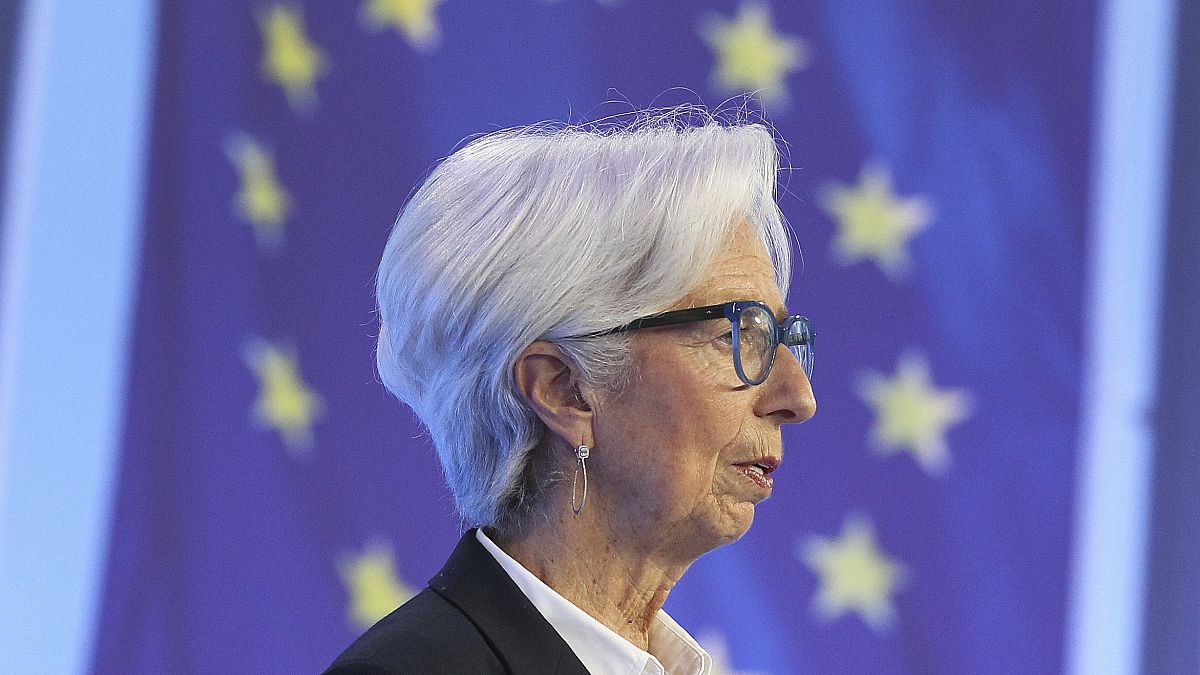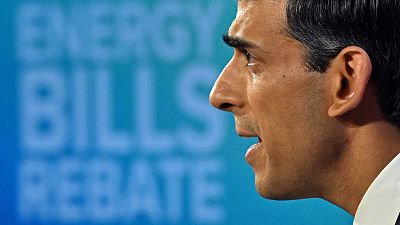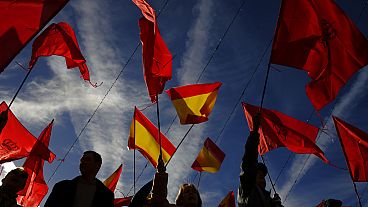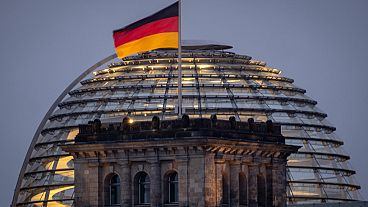The war in Ukraine has sent inflation in the eurozone soaring, threatening the post-pandemic recovery.
2022 was supposed to be the year when the EU moved on from the economic woes of the pandemic and entered a new chapter of recovery and prosperity. Then Vladimir Putin decided to invade Ukraine.
A month after the start of the war, all forecasts and expectations have been thrown out of the window.
Annual inflation in the Eurozone has surged to 7.5%, up from 5.9% in February and higher than most analysts had predicted. Energy prices alone have skyrocketed 44.7% on a yearly basis, a stunning rise compared to the 4.3% rate registered in March 2021.
Companies across the continent are now battling impossibly high bills that threaten to disrupt production and shut down factories while households see their purchasing power plunge at record speed.
As Moscow shows no signs of giving up on its brutal military campaign, uncertainty over the EU's immediate future only deepens. The perfect storm of rising prices, constrained supply chains, and economic deceleration is fuelling fears of stagnation and a sudden halt to the post-coronavirus revival.
"Europe is entering a difficult phase. We will face, in the short term, higher inflation and slower growth. There is considerable uncertainty about how large these effects will be and how long they will last for," said Christine Lagarde, president of the European Central Bank, while speaking last week at an event in Cyprus. "The longer the war lasts, the greater the costs are likely to be."
The extreme circumstances are putting EU institutions and national governments under enormous pressure to deliver fast and tangible solutions for workers and businesses.
Spain recently approved an emergency package to mitigate the economic and social consequences of the Ukraine war from 2,000 miles away, mobilising €16 billion in public funds, including €6 billion in direct support and tax reductions.
It has been one of the worst-hit by the months-long power crunch, with inflation reaching 9.8% in March. The worsening situation prompted the transport sector to organise a 20-day-long strike that caused many supermarkets and factories to run out of supplies.
But while policymakers are rushing to offer relief measures, the war's dramatic evolution is increasing calls for harsher sanctions against Moscow. New reports of indiscriminate killings in Bucha, a suburb northwest of Kyiv, has brought back to the table the potential embargo on Russian energy imports, a drastic proposal that would plunge the bloc into further economic chaos.
Germany, a country heavily dependent on Russian energy, is among the most reluctant countries to take such a radical step, fearing the shock would be too intense for its industry to handle. BMW, Mercedes, and Volkswagen are all wrestling with the ripple effects of the conflict.
"German industry sees the risk of companies facing existential difficulties due to energy prices or because of a Russian halt to exports of energy raw materials," said Joachim Lang, director-general of BDI, the federation of German industries, in a statement to Euronews.
"Already, some energy-intensive companies are being forced to curb production due to exorbitant gas and electricity costs."
The country, Europe's economic powerhouse, is now on the verge of "substantial" recession risk, the government's council of economic advisers has warned. The group slashed its 2022 growth forecast from 4.6% to 1.8%, noting pre-pandemic levels will not be reached before the year's third quarter.
In Lithuania, the EU country with the highest inflation rate (15.5% in March), businesses are struggling to avoid a loss of competitiveness as raw materials from Ukraine, Russia and Belarus vanish and alternatives from different origins bring in additional costs.
"Russia's invasion of Ukraine will add more fuel to the already flaming bonfire of inflation, and that bonfire could burn up all of Lithuania's economic growth in 2022," Vidmantas Janulevičius, president of the Lithuanian Confederation of Industrialists (LPK), told Euronews.
"Rising energy prices have had a major impact on the industry. In addition to the upward trend in commodity prices, the impact of resource growth on companies is becoming difficult to offset."
The long shadow of stagflation
The grim turn of events over the past month has inevitably raised the much-dreaded spectre of stagflation, a period characterised by economic stagnation, high inflation, and high unemployment.
The term stagflation was coined during the 1970s when oil-producing countries proclaimed an oil embargo following the Yom Kippur War and provoked an extraordinary surge in production costs. The move led to an "oil shock" that combined rising inflation with economic decline.
The convergence was then seen as an oddity: when the economy slows down, unemployment rises and consumer demand falls, bringing prices down, not up.
Fifty years later, a new energy crunch threatens to revive stagflation, even if temporarily.
"This is a nightmare because you have negative growth but, at the same time, high inflation. So you should increase interest rates to combat high inflation. But at the same time, you should keep monetary policy very loose because the economy is doing badly," Peter Vanden Houte, chief economist at ING Belgium, told Euronews.
"For the time being, energy prices will remain quite high given the uncertainty of supply from Russia. There's a kind of 'war premium' both in the natural gas price and in the oil price, which will remain part of the price as long as this war lasts. And we have no clue how long that will be."
The ECB is widely expected to end its pandemic-era programme of quantitative easing in the summer and approve the first hike of interest rates in the fourth quarter of this year, although the latest economic data might influence the timeline.
"Incoming data don’t point to a material risk of stagflation," President Lagarde said in remarks delivered before March's inflation reading was released.
"Our baseline projections, which include an early assessment of the impact of the war, don’t foresee a recession, given the euro area’s strong labour market and the fading pandemic."
Lagarde noted the ECB is currently managing three scenarios for 2022: normal (3.7% growth), adverse (2.5%) and severe (2.3%). An ECB spokesperson told Euronews the projections were made in early March, at the onset of the invasion, and the institution will revise its estimations in June, when analysts hope to have a clearer picture of fallout from the war and the trajectory of gas prices.
Energy, however, is not the only headache besetting consumers: inflation is set to be stoked up by an imminent food crisis on a global scale. Ukraine and Russia are considered the breadbaskets of the world, producing about 30% of food commodities such as wheat and maize.
David Beasley, the head of the UN's World Food Program, has said the conflict will create "a catastrophe on top of a catastrophe" and may trigger the worst global food crisis since World War II.
In Brussels, EU officials have sought to reassure citizens that food supplies are guaranteed but that medium-term responses are needed to avoid shortages. March's inflation data suggest an upward trend: food, alcohol and tobacco rose by 5% on annual basis, up from 4.2% in February. Unprocessed food soared by 7.8%, bumped by seasonal factors and higher costs for transportation and fertilisers.
Altogether, the food crisis, the power crunch, the supply chains collapse and the overall trade disruption precipitated by the Ukraine war presage a long, arduous path for the European economy, where high inflation is no longer a temporary dilemma, as many had anticipated before the invasion, and instead becomes a challenge for the long haul, pushing the ECB's 2% target into an uncertain, distant future.
"We also have to take into account that we will have some second-round effects now that prices are high for energy and food. At the end of the day, that might also pop up into other prices. High energy prices will make also other goods and services more expensive," warns Vanden Houte, who had previously described the Ukraine war as "more of a game-changer" than COVID-19.
"All in all, let's say the decline in inflation will be a very slow process. We'll probably have to await until the second half of 2023 before we can talk again of more normal inflation rates."



